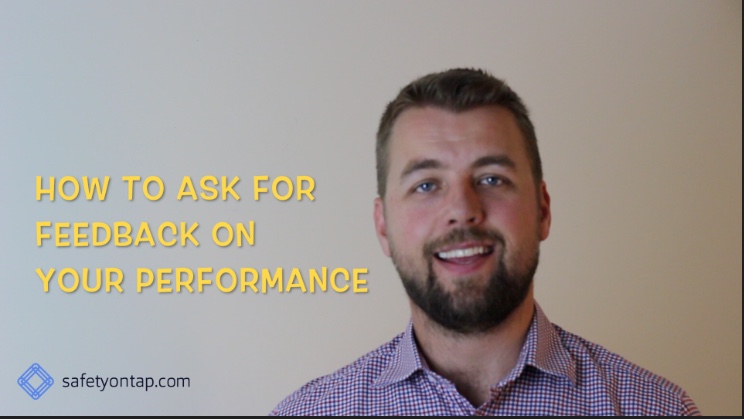Hi there Andrew Barrett here from safetyontap.com.
In this quick video I’m going to share my tips on how to ask for feedback on your performance.
One of the greatest problems you will face as a professional is running blind – relying mostly on your own perception and story about how you are performing, without considering the views of the people you serve.
Offical Performance reviews are often not much help, and if you just rely on those it’s still a fraction of the whole picture. So here’s a feedback formula for that conversation.
Start with WHY you are asking, since they may not know, and a compliment – that you value their opinion, that way they are more likely to say yes.
“I value your feedback since [something of importance/relevance].”
Give them something to work with, helps frame their mind, making the process easier for them. It also respects their time.
“Would you be able to give me some quick feedback on my [context], is now a good time?”/ or you could try “maybe sometime in the next XXXX?”
Wait for their response.
Listen before you proceed – if it’s not right now, ask when. If it’s a straight no, consider asking for a suggestion of someone else they think could provide you feedback.
Now don’t be greedy. Do your own reflection beforehand to hone in on just the one thing you think needs feedback. One thing is as easy as can be for a time and attention starved person.
Also, assuming you get just a snippet of feedback, start with what you can improve – if you ask for general feedback, most people in western cultures will default to praise, which doesn’t tell you much about how to improve.
If they are generous with more time and feedback, then you can always explore what you are doing well so you can boost or replicate those things. Just start with what you can improve.
“Specifically I was wondering how you thought I could improve [specific aspect]? ”
Next is proportionate clarification.
If you aren’t clear, ask for clarification. “So if I understand you correctly…”, and then replay what you’ve heard. I say proportionate clarification, because it’s needs to be proportionate to their feedback.
With a one sentence 15 second comment you won’t stay respectful if you ask a 3 minute clarification question. You’d be better to wait for another time. If they give you a generous response, by all means dig deeper, it’s a sign they want to help you.
Then comes the catch-all, opening up their mind to something you might not have focussed on in your question, but is on their mind. Take what you get here, even if it’s nothing.
“Is there anything else you can think of that might help me?”
Finish with gratitude, remind them, and you, the feedback is directed towards taking action (this will psychologically commit you to getting better and create some external accountability by you saying it to them).
“Thanks so much, you’ve given me plenty to take action on”
So that’s the feedback formula. I want you to improve, and do it with feedback. Go out today, use the feedback formula we’ve gone through now, and get some feedback on your performance. If you like this video, share it with a friend.
If you like it and really want to accelerate your professional growth and effectiveness, I want you to be part of Safety on Tap Connected, the place where leaders like you hang out. Sign-up today at safetyontap.com/connected
I’m Andrew Barrett. Seeya!


Short and sweet Andrew – love it!
It made me reflect on how I ask for feedback. Generally I find myself asking about the content, as people will be more critical about that then one’s performance. However, this makes me think in some situations I should be a bit more of a rogue and just ask.